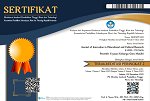Analysis of Religious Characters and Logical Thinking Skills After Using Solar System Teaching Material Integrated with Islamic Science
(1) Universitas Negeri Semarang
(2) Universitas Negeri Semarang, Indonesia; Songkla University Thailand, Thailand
Abstract
This study aims to analyze the religious character and logical thinking skills of students after using solar systems teaching materials integrated with Islamic Science. The type of research used is descriptive analysis with a Post-Test-Only with Non-equivalent Groups research design. The research data were obtained from observation sheets, questionnaire sheets, and posttest. The religious character and students’ logical thinking skills of the experiment class students are better than the control class. Students in the experiment class were superior to the control class. The effect of the correlation of the use of teaching materials on the religious character of the students obtained 79.21%, while the effect of the correlation of the use of teaching materials on students’ logical thinking skills was 38.44%. The study concludes that students’ religious character after using solar system teaching materials integrated Islamic science is dominant in the “very good” category and students’ logical thinking skills after the use of solar system teaching materials integrated Islamic science is dominant in the high category.
Keywords
Full Text:
PDFReferences
Ahmad, N. (2015). Pengaruh Pendekatan Pembelajaran Belief tentang IPA terhadap Kemampuan Penalaran IPA. Jurnal Pencerahan, 1(1), 37-44.
Akhwani & Sigalingging. (2014). Pengembangan Karakter Religius melalui Ekstrakulikuler Yasinan di SMA Negeri 1 Kayen Kabupaten Pati. Unnes Civic Education Journal, 3(1), 11-17.
Alifa, T. F., Ramalis, T. R., & Purwana, U. (2018). Karakteristik Tes Penalaran Ilmiah Siswa SMA Materi Mekanika Berdasarkan Analisis Tes Teori Respon Butir. Jurnal Inovasi dan Pembelajaran Fisika, 5(1), 80-89.
Asyfa, D. S., Sopyan, A. & Masturi. (2017). Pengembangan Bahan Ajar IPA berbasis Komplementasi Ayat-Ayat Sains Quran pada Pokok Bahasan Sistem Tata Surya. Unnes Physics Education Journal, 6(1), 45-54.
Azizah, D., & Kisworo, B. (2018). Implementasi Penggunaan LKPD Qur’ani berbasis Saintifik pada Materi Struktur Atom terhadap Pembentukan Karakter Sains Religi Peserta Didik MAN 1 Plered Kabupaten Cirebon. Jurnal Bio Educatio, 3(2), 14-21.
Bancong, H., & Subaer. (2013). Profil Penalaran Logis Berdasarkan Gaya Berpikir dalam Memecahkan Masalah Fisika Peserta Didik. Jurnal Pendidikan IPA Indonesia, 2(2), 195-202.
Bao, L., T. Can, K. Koening, K. Fang, J. Han, J. Wang, Q. Liu, L. Ding, L. Cui, Y. Luo, Y. Wang, L. Li, N. Wu. (2009). Learning and Scientific Reasoning. Science AAAs, 323(5914), 585-587.
Belzen, J. A. (2019). What, why and how? Meta-reflections on cultural psychological approaches to the scientific study of phenomena called religious. Integrative Psychological and Behavioral Science, 53(1), 158-187.
Brandt, P. Y. (2019). Religious and spiritual aspects in the construction of identity Modelized as a constellation. Integrative Psychological and Behavioral Science, 53(1), 138-157.
Bronkhorst, H., Roorda, G., Suhre, C., & Goedhart, M. (2019). Logical Reasoning in Formal and Everyday Reasoning Tasks. International Journal of Science and Mathematics Education, 1-22.
Bunt, B., & Gouws, G. (2020). Using an artificial life simulation to enhance reflective critical thinking among student teachers. Smart Learning Environments, 7, 1-19.
Creswell, J. (2015). Riset Pendidikan Perencanaan, Pelaksanaan, dan Evaluasi Riset Kualitatif & Kuantitatif (5th ed.). Translated by Soetjipto, H.P., Soetjipto, S.M. 2015. Yogyakarta: Pustaka Pelajar.
Hamzah, F. (2015). Studi Pengembangan Modul Pembelajaran IPA berbasis Integrasi Islam-Sains pada Pokok Bahasan Sistem Reproduksi Kelas IX. Jurnal Pendidikan Islam, 1(1), 41-54.
Hansson, L., Hansson, Ö., Juter, K., & Redfors, A. (2020). Curriculum Emphases, Mathematics and Teaching Practices: Swedish Upper-Secondary Physics Teachers’ Views. International Journal of Science and Mathematics Education, 1-17.
Herbst, J. H. (2020). Controversies on Public Religious Pedagogy: religious education in times of post-democratic populism, global warming and economization of education. Journal of Religious Education, 68(1), 29-41.
Hong, B. A., & Handal, P. J. (2020). Science, Religion, Government, and SARS-CoV-2: A Time for Synergy. Journal of Religion and Health, 1.
Manwaring, K. F., Jensen, J. L., Gill, R. A., Sudweeks, R. R., Davies, R. S., & Bybee, S. M. (2018). Scientific reasoning ability does not predict scientific views on evolution among religious individuals. Evolution: Education and Outreach, 11(1), 2.
Marzuki. (2015). Pendidikan Karakter Islam. Jakarta: Amzah.
Mulyani, A., Ashyar, R., Yelianti, U., & Syarial. (2016). Integrasi Ilmu Pengetahuan Alam dan Nilai-nilai Islam untuk Pembangunan Karakter Peserta Didik di Madrasah Aliyah. Journal of Education in Mathematics, Science, and Technology, 1(1), 16-19.
Palmér, H., & van Bommel, J. (2020). Young students posing problem-solving tasks: what does posing a similar task imply to students?. ZDM, 1-10.
Pratikno, A. S. (2016). Pendidikan Karakter Religius Melalui Pembiasaan Membaca Surat Yasin Secara Klasikal. Prosiding Seminar Nasional Pendidikan Karakter. Yogyakarta, Indonesia.
Purwaningrum, S. (2015). Elaborasi Sains dalam Al-Quran: Langkah Menuju Integrasi Agama dan Sains dalam Pendidikan. Jurnal Inovatif, 1(1), 1-14.
Rizqiana, F. A., Widodo, A. T., & Supardi, K. I. (2017). Pengembangan Bahan Ajar Kimia Berbasis Pendekatan Investigasi untuk Meningkatkan Kompetensi Siswa pada Materi Koloid. Journal of Innovative Science Education, 6(1), 75-84.
Rogińska, M. (2019). Trajectories of (Non) Belief in the Scientific Community: The Case of Polish and Ukrainian Natural Scientists. Review of Religious Research, 61(4), 389-409.
Rosdiana. (2015). Membangun Karakter Mulia pada Anak: Pertimbangan Pengenalan Hukum Islam Semenjak Dini. Jurnal Studi Gender dan Anak, 2(2), 1-13.
Soni, A. S. & Klinar, D. (2010). Integration of Science and Religion with Self Experience of the Observer. Journal for Interdisciplinary Research on Religion and Science, 7(1), 91-95.
Steinfeld, B., Scott, J., Vilander, G., Marx, L., Quirk, M., Lindberg, J., & Koerner, K. (2015). The role of lean process improvement in implementation of evidence-based practices in behavioral health care. The Journal of Behavioral Health Services & Research, 42(4), 504-518.
Refbacks
- There are currently no refbacks.
View My Stats

